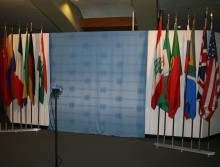
The nations of the world are commenting on Iran deal. UN Press Conference Area. Illustrative. By Joshua Spurlock
From threats to launch their own nuclear weapons program to hope the Iranian deal could boost the economy, Middle East nations presented a variety of responses to the Iran nuclear deal on Tuesday. The deal, which provides Iran with sanctions relief in exchange for restrictions and monitoring of their nuclear program, certainly hasn’t made everyone happy, especially the largest oil producer in the Middle East.
Saudi Arabia – ‘Extremely Dangerous’
The Washington Post quoted an anonymous Saudi diplomat who said they consider the Iran deal “extremely dangerous.” A key concern is the sanctions relief that will provide Iran a huge boost to their economy, as the Saudis fear it will be fed into the Iranian regional war machine already wreaking havoc in Syria and Yemen.
What’s more, the Saudi diplomat warned that his nation would be interested in also developing a “peaceful” nuclear program like Iran, with the option to flip it into a nuclear weapons program if Iran did the same.
Syria – ‘Victory’
Not surprisingly, Syrian President Bashar al-Assad, a key ally with Iran, praised the deal. In a report by the state-run Syrian Arab News Agency (SANA), Assad was quoted as calling the nuclear deal a “great victory” for Iran. Assad, whose regime has been strongly support by Iranian military advisors and Iran’s terrorist proxy Hezbollah, also expressed the hope the deal would allow Iran to do more in the region.
“We are quite assured that the Islamic Republic of Iran will continue, with greater momentum, supporting the just issues of peoples and working for peace and stability to prevail in the region and the world,” said Assad, apparently equating helping in the massacre of Syrian civilians and supporting global terrorism with peace and justice.
Turkey – Economic Opportunity
The Turks, without issuing a full response, were initially cautiously optimistic about the deal. Foreign Minister Mevlüt Cavuşoğlu, according to the Hurriyet Daily News, noted that the removal of sanctions in the deal would assist the regional economy and implied Turkey would also benefit from it. Turkey has in the past sought better relations with Iran, although the nations have differed strongly over nearby Syria.
Along those lines, the Turkish Foreign Minister was quoted as encouraging Iran to “play a positive and constructive role” in the region. If the deal is upheld, the Turkish diplomat believed it would encourage “stability” in the Middle East.
Jordan – Wait and See
The Jordanians released their own statement on the deal, but kept everything intentionally vague. In a report on the Petra News Agency, Jordan said they were discussing the deal with the relevant parties to learn more.
The Petra report said that Jordanian Minister of State for Media Affairs and Communications Mohammad Momani “said that Jordan supports any deal which asserts peace and security in the Middle East and prevents arms race in the region.”
(By Joshua Spurlock, www.themideastupdate.com, July 14, 2015)
